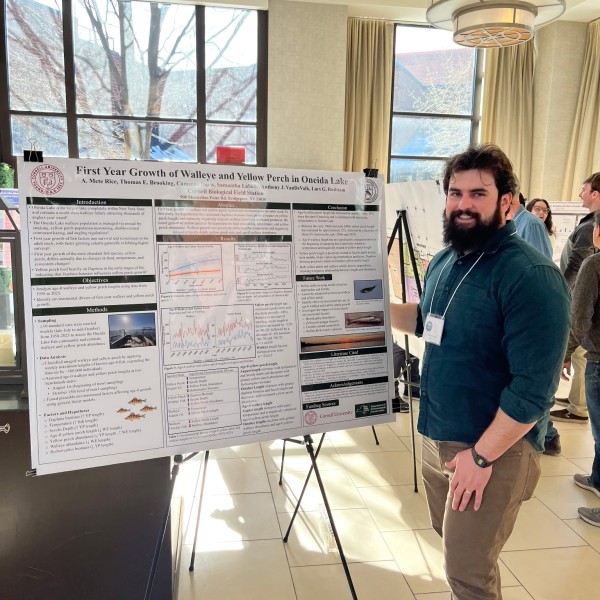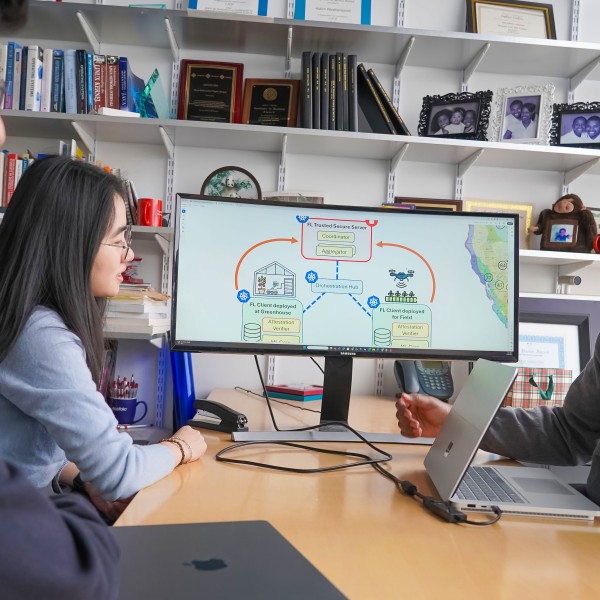Since 2017, Nyrop led with a shared vision for driving sustainable economic development in New York through food and agriculture innovation. Now, Olga Padilla-Zakour, M.S. ’88, Ph.D. ’91, director of the Cornell Food Venture Center (CFVC) at Cornell AgriTech, is building on Nyrop’s vision as interim director for Cornell AgriTech, effective Dec. 1.
Padilla-Zakour, professor of food processing in the Department of Food Science, is the first food scientist to lead Cornell AgriTech in its 140 years. It’s a testament not only to her expertise but also to the innovative impact she has cultivated through the CFVC and across New York over the past 25 years. She spoke with us to reflect on her early passion for science, the CFVC’s beginnings, Cornell AgriTech's future and the food safety tips she wishes more home cooks knew (and used).
How did you find food science? Was it something that interested you at an early age?
I’ve been interested in science as far back as I can remember. One of my most treasured Christmas presents was an optical microscope I received when I was in primary school. In high school, I loved chemistry, mathematics and biology. When I entered college, I discovered that food science – which at the time was a new undergraduate program at the University of Costa Rica – had the right combination of science and technology to fulfill my interests.
What led you to the U.S. and a doctorate from Cornell?
I wanted to pursue graduate studies in food science, but the option wasn’t available in Costa Rica. After graduation, I worked in the food industry for two years with a startup to gain experience then joined the Technological University of Costa Rica to teach chemistry. To realize my dream of studying in the U.S., I applied to different programs and was very fortunate to be awarded a USAID scholarship to pursue a master’s degree in food science at Cornell. It was my first choice due to its top-rated food science program and major strength in fruit and vegetable processing technologies – the area I was most interested in specializing. I was able to continue my Ph.D. program sponsored by the Department of Food Science and Technology at Cornell AgriTech, which changed my life.
In 1997, you became director of the Cornell Food Venture Center, a role you’ve held for 25 years. How has the CFVC evolved since then?
When my mentor Professor Don Downing retired as the first director of the CFVC, I was hired to direct and expand its activities. I pursued more federal and state funding to enhance the center’s services and outreach – offering more assistance in product development, scaling up formulations and manufacturing processes, and educational resources. I increased the personnel from two to eight specialists. When I started, the CFVC worked with 80 clients that developed 200 new products per year. Now we work with over 800 clients developing more than 2,000 new food products per year. We also now offer an online certificate in Food Product Development.
What are the biggest challenges facing businesses you work with today? Are you doing things now that weren’t possible back then?
New food products today are more focused on consumer needs, with clean labels, functional ingredients, more nutritious formulations and sustainable practices. It’s challenging to formulate and preserve foods while retaining their quality and safety. High pressure processing (HPP) is a technology that’s been fully established in the last few years and was not available commercially 25 years ago. HPP has opened the options for minimally processed (no heat applied) refrigerated food products – such as guacamole, juices, beverages, deli meats, seafood and salsas – with extended shelf life without the use of preservatives. Cornell AgriTech has the first commercial scale High Pressure Processing Validation Center installed within a Biosafety Level 2 Facility in a university setting.
What do you like best about your job and working at Cornell AgriTech?
I feel so lucky to work at Cornell AgriTech. Every day you learn something new, either by talking to colleagues, students and clients or through our research and extension work. I love the collaborative and inclusive environment on the Geneva campus. Most importantly, we believe that our work really impacts our stakeholders – farmers, producers, entrepreneurs, educators, inspectors and consumers – in a positive way.
We heard that you’ve played every sport. That can’t be true. Can it?
I do love sports! I played basketball, volleyball and softball in high school, and competed in the 200-meter dash, 400-meter dash and javelin throw. I was selected to play shortstop for the Costa Rican national softball team when the sport was just starting for women. I also have participated in competitive club roller skating – speed and endurance – and recreational soccer. Now I play table tennis and pickleball, sports better suited to my age.
Is there a food safety tip you wish more home cooks knew (and used)?
I’m a believer in measuring the internal temperature of foods to make sure they are safe and properly cooked. Leftovers need to be quickly cooled and stored in the refrigerator or freezer.





